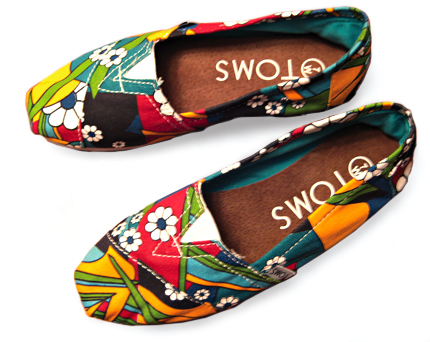TOMS Shoes is a new fashion trend of the movement, which falls on a simple idea. purchased for each pair of TOMS shoes of a consumer, a new pair of shoes, a child will be given to those who need it. This business plan is immediately activated fashion lovers of people in the trailer and fund raising.
In January 2006, TOMS founder Blake Mycoskie, revisited in Argentina, where he worked in The Amazing Race with his sister. With friendship with the local Argentinean Blake was told that there is a great need for shoes from the children she met. After his return to the U.S. has decided to Blake, a company that would provide start: 12:59, sold a pair of shoes for every pair donated. Blake said: "I intend to start a company and for each pair of shoes we sell, will give a pair to someone who needs it."
In 2006, TOMS Shoes has over 10,000 shoes to children in Argentina, where. In 2009, Tom has more than 100,000 shoes to children in Haiti. Since May 2006 TOMS has given over 650,000 pairs of shoes to children who are more than twenty countries.
TOMS has given its name to the desire for good foot health for children prescribed "tomorrow." There are many children in the risk of disease, barefoot growing environments. TOMS research found that, without shoes, children:
Or development of diseases of the ground at work, play or walk to school
Or it may be a number of wounds and cuts that come from walking among the rocks and bare ground
Podo development or a young age. Podo is a physical disease that begins in childhood, like a bad smell, the damage that the members can,.

TOM shoes

TOM shoes

TOM shoes
TOMS Shoes is based on a style shoes Alpargata. With many colors, fabrics and styles, each pair is a separate piece of art in itself. The style of the shoes are sold Alpargata was borne by farmers in Argentina for over 100 years. These shoes, cotton or linen are made of a lightweight, with rubber sole. TOMS is now also sells vegan styles of their favorite shoes. Blake said: "We demand that factories operate in healthy working conditions, pay fair wages to local labor market and a code of conduct signed by all plants
In January 2006, TOMS founder Blake Mycoskie, revisited in Argentina, where he worked in The Amazing Race with his sister. With friendship with the local Argentinean Blake was told that there is a great need for shoes from the children she met. After his return to the U.S. has decided to Blake, a company that would provide start: 12:59, sold a pair of shoes for every pair donated. Blake said: "I intend to start a company and for each pair of shoes we sell, will give a pair to someone who needs it."
In 2006, TOMS Shoes has over 10,000 shoes to children in Argentina, where. In 2009, Tom has more than 100,000 shoes to children in Haiti. Since May 2006 TOMS has given over 650,000 pairs of shoes to children who are more than twenty countries.
TOMS has given its name to the desire for good foot health for children prescribed "tomorrow." There are many children in the risk of disease, barefoot growing environments. TOMS research found that, without shoes, children:
Or development of diseases of the ground at work, play or walk to school
Or it may be a number of wounds and cuts that come from walking among the rocks and bare ground
Podo development or a young age. Podo is a physical disease that begins in childhood, like a bad smell, the damage that the members can,.



TOMS Shoes is based on a style shoes Alpargata. With many colors, fabrics and styles, each pair is a separate piece of art in itself. The style of the shoes are sold Alpargata was borne by farmers in Argentina for over 100 years. These shoes, cotton or linen are made of a lightweight, with rubber sole. TOMS is now also sells vegan styles of their favorite shoes. Blake said: "We demand that factories operate in healthy working conditions, pay fair wages to local labor market and a code of conduct signed by all plants